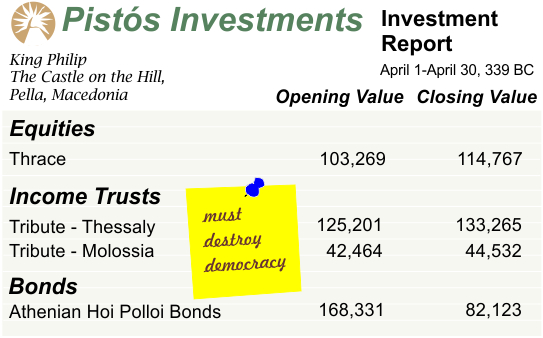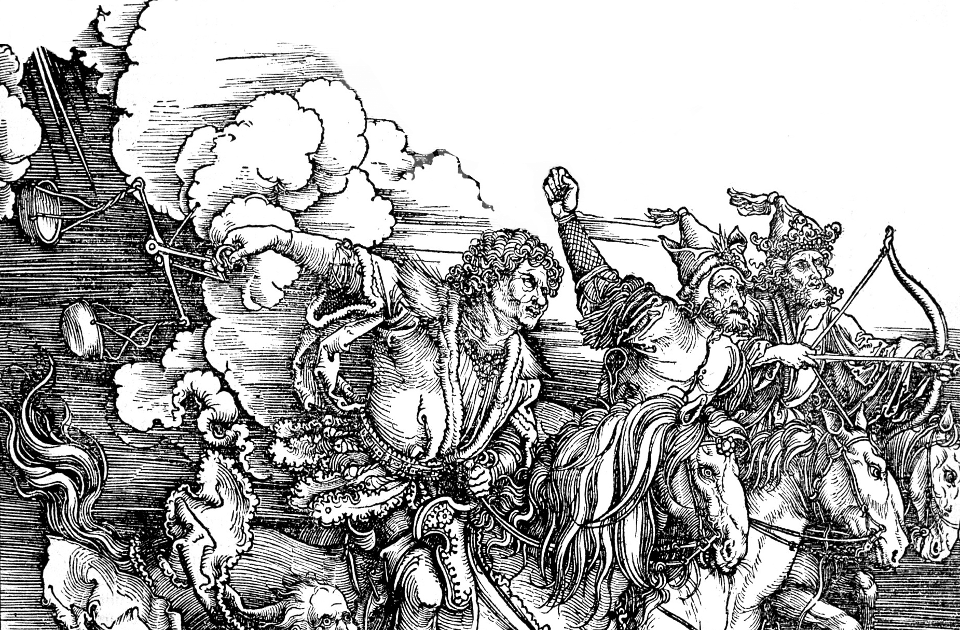Rioting in Athens this week resulted in an unexpected discovery. Rioter Petros Demonopolis explains,
“I was removing cobbles from the square in front of the Temple of Zeus so that we could throw them at riot police, when I uncovered this ledger book. At first I thought that it was just something from last weeks looting of the Greek National Bank when I noticed its date – April 30, 339 BC. When I looked closer I realized I’d found one of Philip of Macedon’s brokerage reports.”
Professor Abraxas from the Greek National Archive clarifies, “People tend to remember Philip I of Macedonia as the unifier of Ancient Greece and father of Alexander the Great. He was also an activist investor, not unlike Carl Icahn. Initially he favored equities, city states and that sort of thing. But sometime around 350 BC someone – we think it might have been Aristotle – suggested that he diversify his portfolio and buy bonds. He particularly favored Hoi Poloi bonds, which Athens floated to finance the dole.”

“What’s so special about the date of Philip’s statement?”
Professor Abraxas replies, “339 BC was a big year in Greece. International capital markets had begun to doubt the ability of democratic poli to deliver double digit returns. And if you look at the evidence, you have to admit that Sparta’s Helot development model looked pretty good in the fourth century BC. Not unlike China, today. Ask any Uighur.”
“The roaring 340s came to an end brutally, with a financial panic and a run on the bond market. You can see it in Philip’s brokerage statement. His investment in Hoi Poloi Bonds halved in value in just one month, in April 339 BC. Athens attempt to renegotiate the bonds went over very badly with King Philip – he wasn’t the kind of monarch to take drachmas on the talent. Think Angela Merkel with a beard and iron mace. Within months of receiving this very statement, Philip had defeated a combined army of Athenians and Thebans at Chaeronea, and preserved his capital.
The academic pensively inhales on his pipe before concluding, “It makes you wonder, doesn’t it, what history would have been like had a European Central Bank existed back then. Without the 339 bond run would Philip’s son Alexander gone on to Hellenize Persia, or would he have been content to stay home and clip coupons?”
Many take this discovery as proof that history doesn’t just rhyme, its redundant.
Historical Notes: Hoi Poloi bonds – first floated by Peisistratos in 549 BC in order to finance the great extension of the Athenian dole that took place with the inclusion of the Hyperakrioi as a formal Athenian political party. The bonds were renowned as the safest Hellenic investment until a series of democratic governments dramatically expanded Athenian debt in the so-called “roaring 340s”. The subsequent collapse of the Athenian bond market in 339 BC is frequently cited by supporters of the Spartan economic model as evidence of the fatal weakness of democratic government.
The Battle of Chaeronea, 338 BC, resulted in the final defeat of the democratic poli of Greece by Philip of Macedon.
There are 600 drachmas to the talent. Alexander the Great famously paid 40 talents for his favorite horse.


